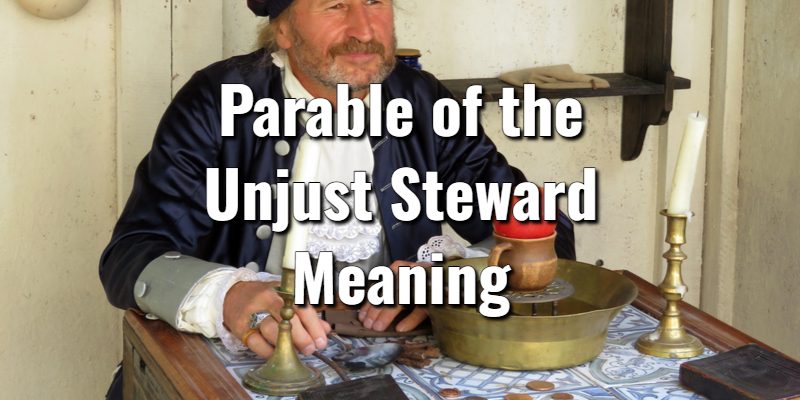The Parable of the Unjust Steward is a story told by Jesus in the Gospel of Luke. In this parable, Jesus uses a story to teach a lesson about the wise use of worldly wealth and the importance of being faithful in small matters. In summary: A rich man had a steward (or manager) who was accused of wasting his possessions. The rich man called the steward and told him he would be fired from his position. However, before being dismissed, the steward decided to take action. He called in each of his master’s debtors and asked them to reduce their debts by writing new promissory notes with lower amounts. This was done to win favor with these debtors and secure his future. When the rich man found out about what the steward had done, he commended him for his shrewdness because, despite being dishonest, the steward had acted wisely in securing friends for himself using the wealth of his master.
Jesus concludes the parable by saying: “Ye cannot serve God and mammon.”
Parable of the Unjust Steward Meaning
The Parable of the Unjust Steward meaning can be found in Luke 16:1-13:
Luke 16:1-13
“And he said also unto his disciples, There was a certain rich man, which had a steward; and the same was accused unto him that he had wasted his goods. And he called him, and said unto him, How is it that I hear this of thee? give an account of thy stewardship; for thou mayest be no longer steward. Then the steward said within himself, What shall I do? for my lord taketh away from me the stewardship: I cannot dig; to beg I am ashamed. I am resolved what to do, that, when I am put out of the stewardship, they may receive me into their houses. So he called every one of his lord’s debtors unto him, and said unto the first, How much owest thou unto my lord? And he said, An hundred measures of oil. And he said unto him, Take thy bill, and sit down quickly, and write fifty. Then said he to another, And how much owest thou? And he said, An hundred measures of wheat. And he said unto him, Take thy bill, and write fourscore. And the lord commended the unjust steward, because he had done wisely: for the children of this world are in their generation wiser than the children of light. And I say unto you, Make to yourselves friends of the mammon of unrighteousness; that, when ye fail, they may receive you into everlasting habitations. He that is faithful in that which is least is faithful also in much: and he that is unjust in the least is unjust also in much. If therefore ye have not been faithful in the unrighteous mammon, who will commit to your trust the true riches? And if ye have not been faithful in that which is another man’s, who shall give you that which is your own? No servant can serve two masters: for either he will hate the one, and love the other; or else he will hold to the one, and despise the other. Ye cannot serve God and mammon.”
Lord's Library participates in affiliate programs. We may make a small commission from products purchased through this resource.
- The 4 Best Timothy Commentaries to Read in 2024 - October 15, 2024
- The 5 Best Timothy Bible Study Books to Read in 2024 - October 15, 2024
- Isaiah 64:6 Meaning: Commentary on an Important Scripture - October 14, 2024













